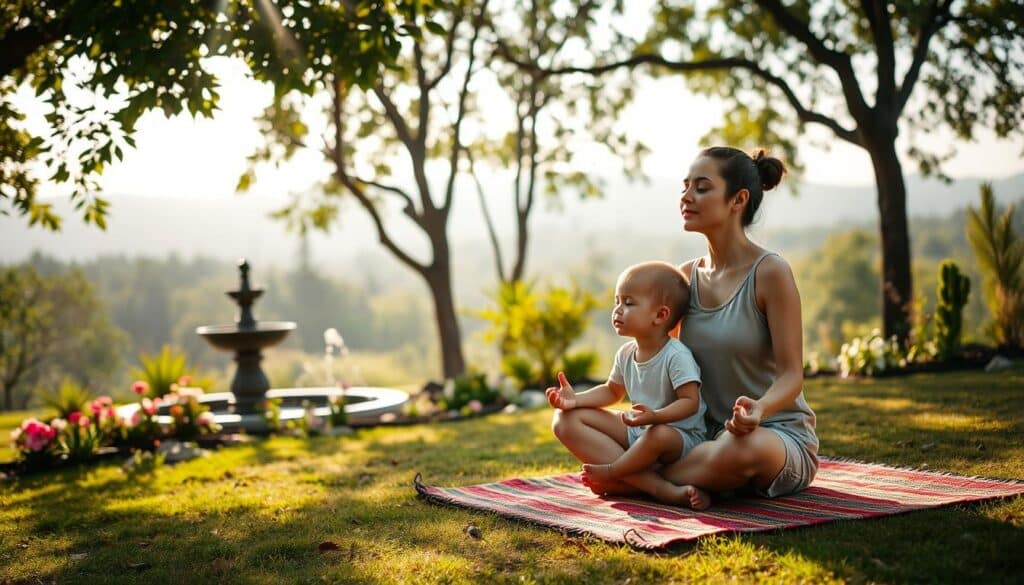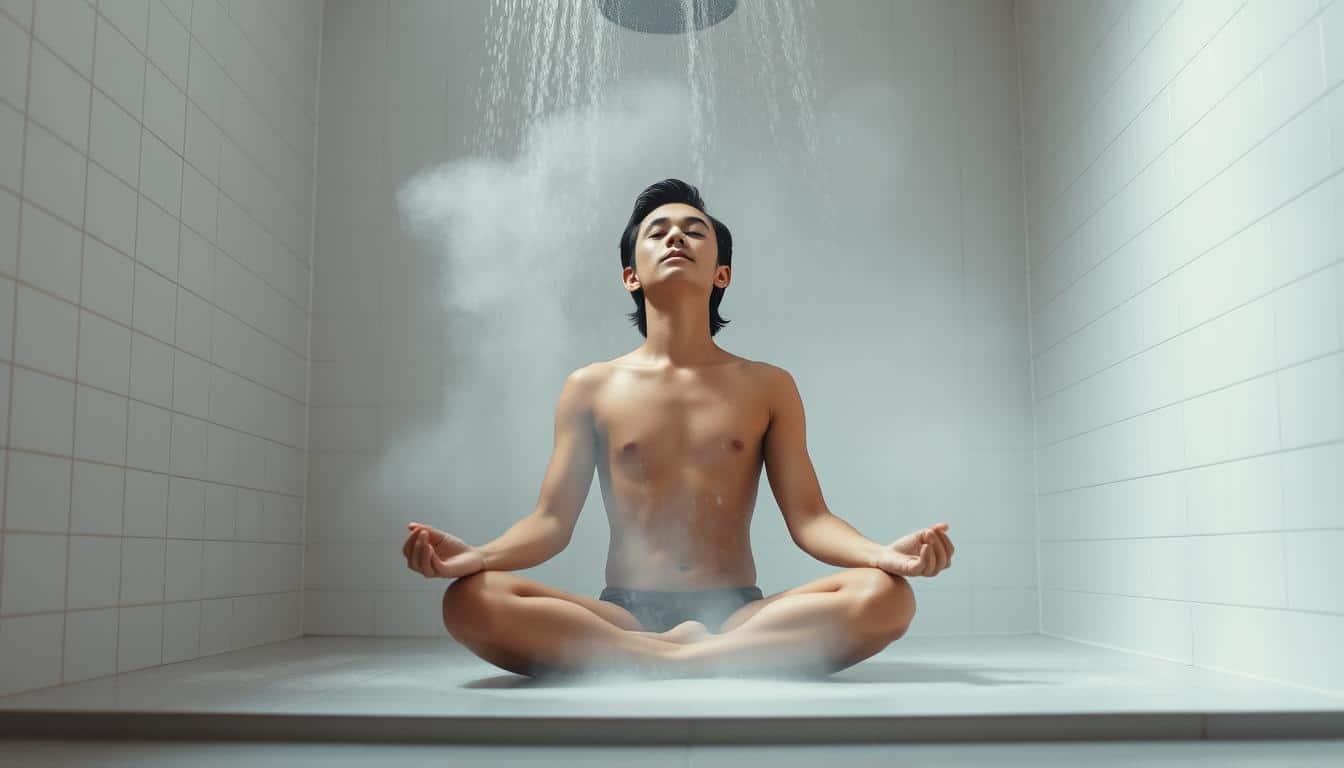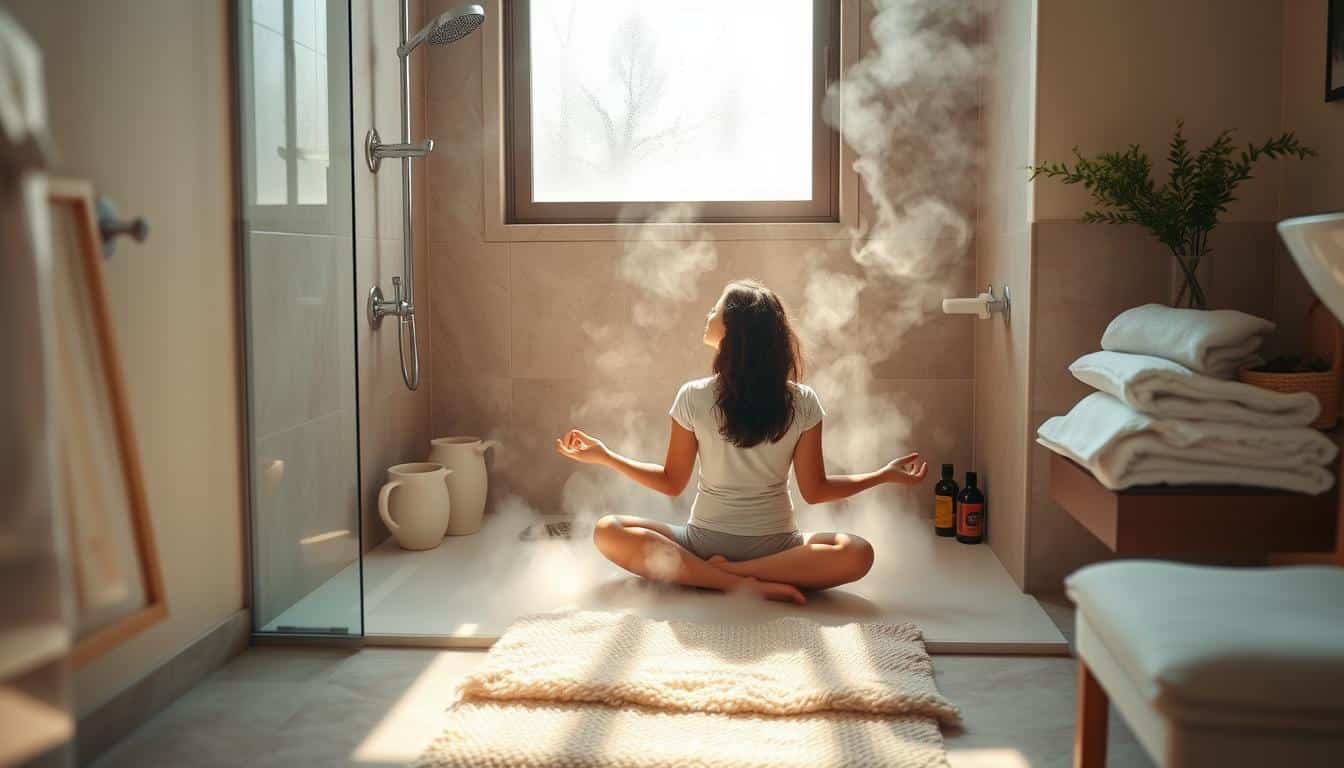Parenting in today’s fast-moving world can be tough. But, adding shower mindfulness to your day can make a big difference. It’s not just about clearing your mind; it’s also about managing your feelings better. And it’s a way to take care of yourself too. Realizing the stress that comes with raising kids and using mindfulness in simple actions like showering can help you stay calm and present.
Shower mindfulness gives parents a chance to hit reset and think before reacting to their kids. It helps you see what sets off your stress and gives you a moment to stop before you react. By focusing on your breathing and how your body feels, showering becomes a powerful tool. This can help make your relationship with your kids stronger. Find out how shower mindfulness can change your daily life and make parenting better.
The Power of Mindfulness in Parenting
Parenting is tough, and it can really stress you out. This is especially true for parents with kids who have ongoing health issues. They often feel swamped and can’t find ways to deal with it well. But getting to grips with the stress of parenting can help improve your mental health and happiness.
Understanding Parenting Stress
About 19.8% of kids in the U.S. are living with chronic conditions. Their parents tend to feel more stressed, anxious, and depressed. This extra stress can make it hard for parents to support their child the way they need. Knowing where this stress comes from can help parents manage their feelings better.
Mindfulness as a Solution
Mindfulness is a great way to reduce stress from parenting and find better ways to cope. It’s all about focusing on the present moment in a deliberate, nonjudgmental way. This approach helps parents connect deeply with themselves and their children. Studies have shown that mindfulness can lower anxiety and help parents control their emotions better.
By hitting the ‘pause button’ on negative thinking, parents can interact with their kids in a more positive manner. This leads to a stronger bond between parent and child. Mindful parenting programs have even been shown to lessen parental stress and reactions. They help create a more caring home environment.
How Shower Mindfulness Works
The idea of shower mindfulness combines mindfulness science with the soothing effect of showers. It shows how our minds react to quiet reflection. This can help parents reduce stress and get clearer thinking.
The Science Behind Mindfulness
Studies show our right temporal lobe gets active during deep thoughts. This lets us link new ideas with what we already know. It helps us think clearer. There’s something called a “brain blink” right before we get an insight. It leads to a burst of alpha waves which lowers visual cortex activity, making us focus inward. This knowledge can make mindfulness in other situations better.
Benefits of Showering for Mental Clarity
Showering is great because it’s like sensory deprivation—it’s similar to a brain blink. It boosts creativity and helps come up with new ideas. The warm water makes us release endorphins, easing stress and improving focus.
To make your shower mindful, try these tips:
- Create a calming environment with dim lighting.
- Incorporate soothing scents like lavender or eucalyptus.
- Utilize breathwork techniques to maintain present-moment awareness.
- Set sensory anchors, such as specific body washes, to trigger mindfulness.
Combining these can help control emotions. This is key for parents trying to handle stress better.
Enhance Parenting Skills Through Shower Mindfulness
Shower time can be a moment for self-connection, helping parents become more aware. This awareness is key for facing parenting challenges. By paying attention to the water and sounds, parents can find mental clarity and emotional balance.
Connecting with Yourself in the Shower
The Five Breaths – Five Senses Meditation is great during a shower. It allows parents to focus on their breathing and the water’s touch. Hearing the water’s flow also helps lower anxiety and stress.
- Focus on their breath and the rhythm of inhalation and exhalation.
- Notice the feelings of water on their skin, creating a deeper sensory awareness.
- Listen to the soothing sounds of water, which can reduce anxiety and stress levels.
This approach helps parents manage their emotions better. It also helps build a stronger bond with their kids.
Transforming Shower Time into Mindful Moments
Showering can become a time for mindfulness. This change includes tasks like:
- Setting daily intentions that encourage positivity throughout the day.
- Paying attention to the present moment through sensory experiences, not only enhancing mindfulness but also improving parenting skills.
- Spending 3-5 minutes in quiet reflection, which can significantly impact mental health and emotional well-being.
By making these practices routine, parents can connect deeper with their children. It strengthens their emotional bond.
Simple Shower Mindfulness Techniques
Adding mindfulness techniques to your shower can greatly boost your mental and emotional health. Here are easy ways to focus on your breath and feel thankful while showering. This everyday task becomes a chance to reconnect with yourself.
Breath Awareness During Your Shower
Start your shower wanting to clean your body and mind. Imagine the water taking away all bad thoughts and feelings, refreshing you. Pay attention to how the warm water and soap feel, and let these sensations bring you to the now. Simple steps to keep your mind focused while in the shower:
- Take deep breaths, feeling your chest rise and fall.
- Notice how the water temperature changes when you turn the faucet.
- Do a body scan, paying attention to each part as water touches you.
Practicing Gratitude While Showering
Shower time is perfect for thinking about what you’re thankful for. Enjoy the warm water and think about the good things in your life. Even small joys can change how you feel. To make gratitude part of your shower:
- Think of three things you’re grateful for each shower.
- Put reminders to think about what you’re thankful for in your calendar.
- Remember, being mindful is a journey that needs patience and regular effort.
Turning Daily Routines Into Mindful Practices
Busy parents can improve their emotional well-being by adding mindfulness to their routines. Each day offers chances to take a break and improve your mental well-being. Shower time is perfect for a mindfulness break, beyond just cleaning.
Incorporating Mindfulness at Busy Times
It takes effort to find moments for mindfulness on busy days. Even though we’re often too busy, small mindful practices can make a big difference. Here are some tips:
- Take deep breaths when moving between tasks to ground yourself.
- Engage in simple stretches while waiting for the kettle to boil.
- Focus on the sounds and sights around you during short breaks.
- Set reminders on your phone to pause and check in with your feelings throughout the day.
Using Shower Time to Reset Your Day
For busy parents, the shower can be a peaceful retreat. Make shower time more than just cleaning. It’s ideal for a mindful break. Try these ideas:
- Allow water to wash away stress by concentrating on its warmth and movement.
- Practice gratitude by reflecting on positive moments from your day, no matter how small.
- Incorporate a few minutes of deep breathing, appreciating each inhale and exhale.
- Visualize letting go of daily anxieties with every drop of water that runs off your body.
By adopting these methods, making daily mindfulness easy for parents becomes possible. This helps cope with parenting challenges more clearly and calmly. It turns everyday routines into chances for emotional growth and self-care.
Mindfulness Activities for Parents and Children
Doing mindfulness activities together strengthens family bonds. It helps parents and kids feel more connected and happy. Simple activities can make everyone more mindful and present every day. These activities help families share experiences and learn about being mindful together.
Reading Mindfulness Storybooks Together
Reading books about mindfulness is a fun way for families to spend time together. These books often talk about being aware, thankful, and living in the moment. They can start conversations about feelings and life, helping kids to talk about their thoughts. This not only deepens understanding of mindfulness but also creates special moments of connection.
Creating Family Mindfulness Rituals
Starting mindfulness rituals makes everyday life special. Families can do things like:
- What Made You Smile Today? – Sharing happy moments from the day, builds gratitude and emotional connection.
- My Toes Aren’t Upset – Kids move their toes to let go of stress, which is fun and mindful.
- Sleeping Tigers – A game that helps kids learn to be still, focused, and relaxed.
- What’s the Best Smell? – Smelling different things increases awareness of scents.
Adding these activities into your daily life shows kids how to be mindful. By touching various textures, overcoming stress, and doing simple breathing exercises, families build a mindful life. These activities support each other’s mental health for a lifetime.

Support Systems to Enhance Mindfulness
Parents aiming to be more mindful need a strong support system. Joining a mindfulness community lets them connect with others who have similar journeys. Support systems provide useful insights and tips, making mindfulness more doable and fun.
Connecting with Other Mindful Parents
Connecting with mindful parents is very helpful. It creates a sense of community, sharing helpful practices and resources. Programs like the Mindfulness-Based Childbirth and Parenting (MBCP) reduce postpartum depression and boost parenting skills through support.
Being part of such groups can lessen stress and improve mental well-being. This not only helps parents but also their children.
Resources for Learning More About Mindfulness
Finding resources on mindfulness can deepen your understanding and improve your methods. Look into books, online courses, and community programs. The MBCP program is one example, offering techniques like body scans, yoga, and meditation that fit into your daily life.
These practices help with emotional control and better attention, making parents more effective. They are easy to include in everyday routines.
Common Challenges in Embracing Mindfulness
For many parents, the idea of mindfulness can seem tough with all their daily tasks. Parenting comes with a lot of stress. Knowing the challenges of mindfulness can help parents be kinder to themselves. They can also take care of their mental health better during the parenting journey.
Overcoming the Stress of Parenting
Family life stress can really pile up. It’s hard for many parents to handle tough feelings and react well. Using tools like Dr. Gloria Willcox’s Feelings Wheel can make mindfulness better. It helps parents know their feelings more.
This helps control emotions, which lowers stress from parenting. Knowing what makes us upset is key to a healthy bond with our kids and ourselves.
Finding Time to Practice Mindfulness
It can feel nearly impossible to find mindfulness time in a busy home. Work, deadlines, and school stuff keep parents super busy. But practicing regularly is needed to build mental strength and balance.
Adding mindfulness to simple things like shower time can help a lot. This lets parents find moments to stay focused and think deeply about their lives.
Conclusion
Mixing mindfulness into how we parent can deeply change family life and boost emotional health. We’ve learned that being mindful during something as simple as a shower can make parenting better. Taking a bit of time each day for mindfulness makes parents more aware. This awareness leads to healthier family ties and stronger bonds with our kids.
Being mindful helps parents communicate better and be more okay with making mistakes. This is key for handling the tricky parts of raising kids. A study in the Journal of Contextual Behavioral Science shows this too. It found a 20% drop in stress for those who practice mindfulness. Also, 75% of people kept up their new skills three months after learning them. This shows regular mindfulness practice has long-term benefits.
When parents use mindfulness, especially during shower time, they ready themselves to better manage stress. This isn’t just about the parents growing. It’s about making a space where kids learn important skills like controlling their impulses and managing their emotions. Start today and see how mindfulness can change your parenting for the better.


